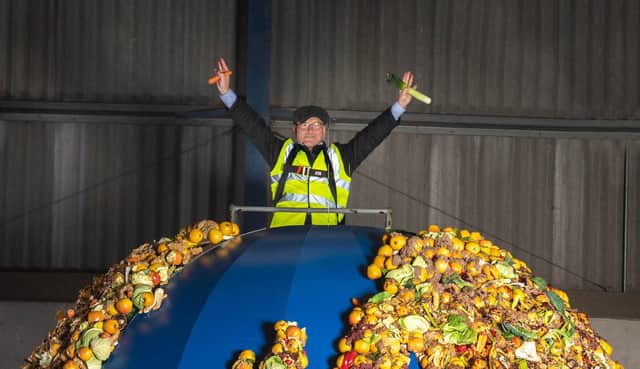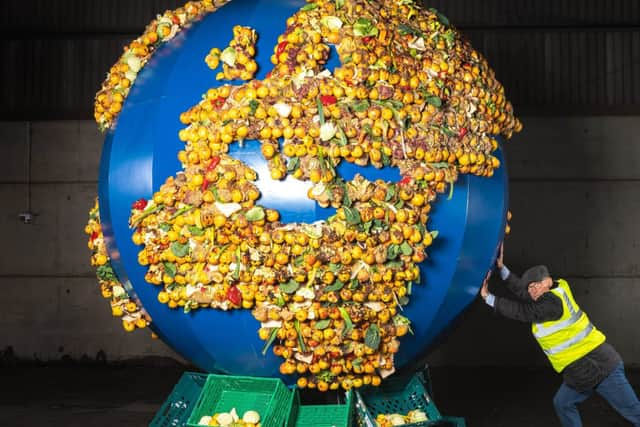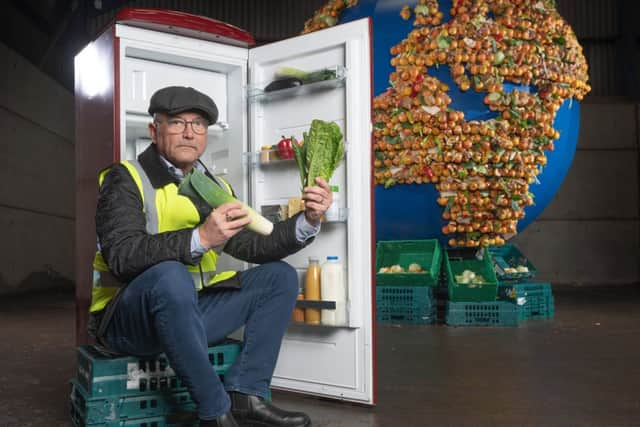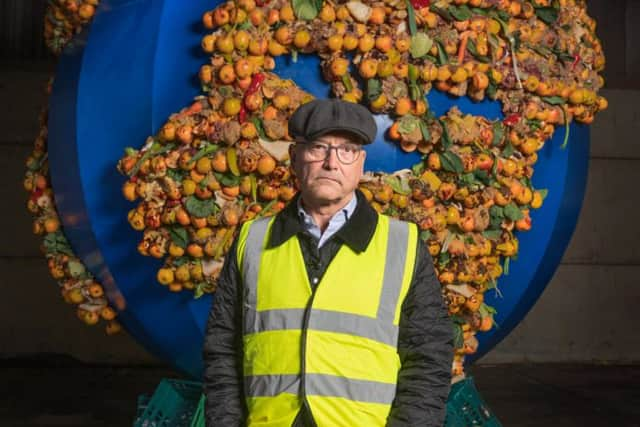UFOs and freezer disasters contribute to UK’s household food waste - Gregg Wallace shows how


Getting on top of food waste
With UK households wasting on average the equivalent of eight meals a week, (87,000 tonnes of food waste across all households in seven days), TV presenter Gregg Wallace joins Food Waste Action Week to help households get on top of food waste and spread the message Wasting Food Feeds Climate Change.
To launch the week, Love Food Hate Waste will be revealing a shocking new installation showing the scale of UK household food waste from one single household over one year in the form of a 10ft food waste planet.
Advertisement
Hide AdAdvertisement
Hide AdNew survey finds the UK freezers contain UFOs (unidentified frozen objects) with over a third of people admitting their freezer is sometimes a total disaster, and extremely hard to work out the contents. 19 per cent of people threw away something frozen in the past two weeks because it has laid dormant for too long.


Food Waste Action Week goes global with Weeks running simultaneously in Canada, the USA, South Africa, Australia and Mauritius.
The second annual Food Waste Action Week begins today, Monday March 7, with television presenter Gregg Wallace taking the reins to raise people’s awareness of the huge impact of household food waste on climate change and share practical advice, food savvy behaviours and tips on how we can all easily reduce the food we waste in our homes.
Particular attention is being paid to the UFOs that get stuck in our freezer and never find their way onto our plates.
Advertisement
Hide AdAdvertisement
Hide AdWith only around one-in-three people in the UK seeing a clear link between wasting food and climate change, Gregg has been working with Love Food Hate Waste – the brand behind the Week of action - to create a powerful installation using food waste to show the scale of the issue.


The installation brings to life the campaign’s hard-hitting creatives to convey the fact that food going to waste in our own homes is directly feeding climate change. The campaign will run in the UK and globally across social media channels.
Gregg Wallace, TV presenter, said “No one hates seeing good food go to waste more than I do, and often it’s simple changes in how we store food that make the biggest difference.
"That’s why I’m delighted to support this year’s Food Waste Action Week and Love Food Hate Waste."


Advertisement
Hide AdAdvertisement
Hide AdGregg added: "The fact is, we are all responsible for the vast majority of food waste that happens in the UK - 70 per cent - so we really need to be part of the solution for the sake of the planet.
And with food prices going up and other pressures on disposable income, the savings you’ll make to the family budget by wasting less food are significant.”
We throw away 6.6 million tonnes of household food waste a year in the UK. This food waste is responsible for nearly 25 million tonnes of CO2 emissions, equivalent to 5.4 per cent of the UK’s territorial emissions.
The majority, 4.5 million tonnes is food that could have been eaten and is worth approximately £14 billion (or £60 a month an average family with two children). It requires an area almost the size of Wales to produce all the food and drink currently wasted in the UK.
Advertisement
Hide AdAdvertisement
Hide AdLove Food Hate Waste runs an annual survey of people’s habits and knowledge around food waste.
This highlighted that 81 per cent of UK citizens are concerned about climate change, but only 32 per cent see a clear link with food waste.
The survey helped to inform the theme of the Week and the development of materials to motivate people to act.
This year, Love Food Hate Waste found that the public’s relationship with its freezers has become particularly frosty, with 35 per cent of the population saying their freezer is “sometimes a total disaster and [it’s] extremely hard to work out what’s in there.”
Advertisement
Hide AdAdvertisement
Hide AdAnd 19 per cent of people having thrown away something frozen in the past two weeks because it has laid dormant for too long.
More worryingly, as many as 69 per cent of people believe it’s safe to defrost meat at ‘room temperature’, which is the exact opposite of Food Standards Agency guidance and may be putting them at risk of illness.
Words of advice
Sarah Clayton, Love Food Hate Waste said: “Getting to grips with freezing and defrosting are big factors in preventing food from going to waste at home."
She added: "At a time of rising food prices alongside huge public concern about climate change, tackling food waste at home is one way we can all make a difference and save money.
Advertisement
Hide AdAdvertisement
Hide Ad"For the average family with children, the cost of binning food can be more than £700 per year. So, Food Waste Action Week is all about avoiding those UFOs and being savvy in how we store but then use our food.”
Use your freezer more
Love Food Hate Waste is keen to show that used properly, the freezer is the king of the kitchen. In fact, freezing and defrosting just three key meat items that are commonly not used in time (fresh chicken, bacon, and sausages) could reduce waste of those items by as much as 15,000 tonnes per annum.
And, when it comes to defrosting, busy households can avoid a lengthy overnight defrost by using their microwave instead – as people use a toaster to defrost sliced bread from the freezer.
More than 15 influencers, including chef Melissa Hemsley are lending their support to Food Waste Action Week through their social channels, demonstrating key food behaviours that can help to prevent food waste.
Advertisement
Hide AdAdvertisement
Hide AdAnd the focus on food waste will be extended through the hospitality and food service sector, with the Guardians of Grub campaign providing free resources and advice for out of home eateries to focus on food waste during the Week.
Love Food Hate Waste is also asking the public to share their own Unidentified Frozen Objects on social media, using the hashtag #FoodWasteActionWeek to drive home the importance of labeling the food we freeze.
Food Waste Action Week will signpost people to information and resources on the Love Food Hate Waste website to help tackle a range of common food waste issues.
And for the first time Food Waste Action Week is also working with partners around the globe to make this an international week of action.
Global action
Advertisement
Hide AdAdvertisement
Hide AdPartners will be supporting the campaign from 12 countries including Canada, USA, Australia, South Africa, Hungary, Czech Republic, Slovakia, Mauritius, Indonesia, Jordan, The Netherlands and New Zealand.
Love Food Hate Waste is grateful too for the support of some of the UK’s largest retailers and food brands who have provided financial donations to help amplify the week: including Aldi, Danone, Dunbia, KFC, IHG Hotels and Resorts, Ocado, OLIO and Sodexo.
Resources and Waste Minister Jo Churchill said: “Throwing good food away is a terrible waste of resources, water and energy.
"The amount of food we waste each year weighs the equivalent of over a million Asian elephants. Almost 70 per cent comes from our own homes and the impact on the environment is immense.
Advertisement
Hide AdAdvertisement
Hide Ad“Food Waste Action Week is hugely important in bringing together the entire food supply chain, from farm to fork, to take action on this critical issue.
"There is a lot we can do as consumers, and I would encourage everyone to think about simple and creative ways to help us reach our ambitious target to halve food waste by 2030.”